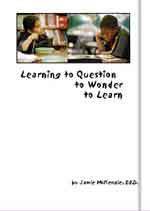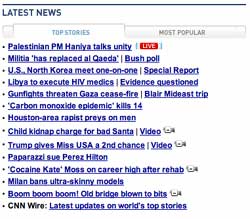| Please feel free to e-mail this article to a friend, a principal, a parent, a colleague, a teacher librarian, a college professor, a poet, a magician, a vendor, an artist, a juggler, a student, a news reporter or to anyone else you think might enjoy it. |
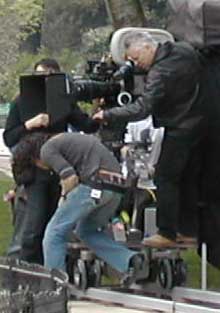
Photoshopping Reality:
Journalistic Ethics
in an Age of Virtual Truth
By Jamie McKenzie
About author
The phrase "journalistic ethics" may become an oxymoron as the media play for this society the role the circus played for Rome, entertaining rather than educating. Jumbo shrimp. Journalistic ethics. Airplane food. Oxymoronic.
How do young people learn what is happening in their world when the attention of the news cameras swings after just two days of coverage from North Korea's nuclear test to the airplane crash of a Yankee player?
The typical news day is dominated by stories that are sensational or entertaining rather than illuminating. Consequently, our view of the world and its events is routinely and daily narrowed, darkened and distorted. See below for examples.
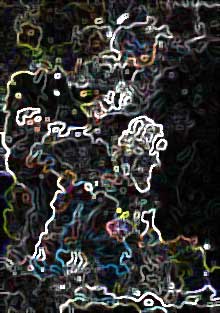
|

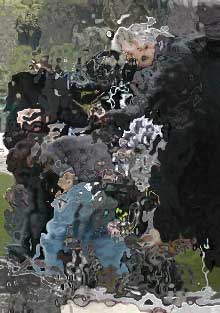
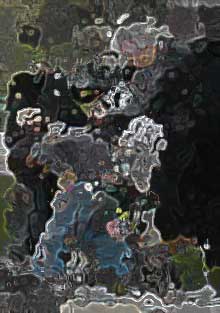 Original photograph by Jamie McKenzie in Paris. Camera crew filming scene for the TV program ER. © 2006, Jamie McKenzie
Original photograph by Jamie McKenzie in Paris. Camera crew filming scene for the TV program ER. © 2006, Jamie McKenzie
|
| A News Day at CNN - December 15, 2006
These stories were featured at http://cnn.com:
- Execution was botched, medical examiner says
- Rumsfeld praised on final day at Pentagon
- Climbers' kin cling to hope as storm rages
- Ford: No way we'll make four-door Mustang
- Bush 'happy' for pregnant Mary Cheney
- Prince William graduates as Kate, queen watch
- Paternity test ordered for Duke accuser's baby
- Dr. Gupta: Breast cancer drop, hormones linked
- Folks try to adopt pup that ate baby's toes
- Is the Brangelina baby cuter than a panda cub?
- Atlanta panda cub named
- Miss USA 'issues' have her in trouble
- CNN Wire: Latest updates on world's top stories
|
A News Day at the AP - December 15, 2006
- Hamas, Fatah clash in deepening violence
- Johnson shows signs of surgery recovery
- 4 dead as storm batters Northwest
- Somali leader: Peace talks not an option
- Paternity test ordered in Duke rape case
- Pope's preacher calls for abuse penance
- Ousted tenor blames low blood sugar
- Nintendo to replace 3.2M Wii straps
- Astros' Bagwell retires after 15 years
- Immigration raids may affect meat prices
- Miss USA's 'personal issues' scrutinized
- Smith grows up as 49ers beat Seahawks
- Army moves to reduce strain on troops
- Polygamist leader ordered to stand trial
- FBI: Cleric's illness may spark attack
- Chertoff defends rail security plan
- NASA tries to fix station's solar panel
- Report finds Diana's death wasn't murder
- World's first cloned cat has kittens
- Investment banks post record earnings
- Matsuzaka's the toast of Beantown
- Breast cancer drop tied to hormones
- Group not satisfied with Rosie's apology
- Official says Fla. execution was botched
- Cuban group said to include 7 deported
- W.Va. school board to pay $2.2M in death
- Pilot recalls shoot-down during escort
|
| Content Analysis
What portion of the articles above was made up of basic news stories and what portion was devoted to entertainment, sports, celebrity lives, scandals, weird events and stories with shock value?
Judge for yourself.
- Folks try to adopt pup that ate baby's toes
- Is the Brangelina baby cuter than a panda cub?
- Paternity test ordered for Duke accuser's baby
- Atlanta panda cub named
- Miss USA 'issues' have her in trouble
- Paternity test ordered for Duke accuser's baby
In what ways is this like the Roman circus?
|
Photoshopping   
Thanks to new technologies, we can adjust our public images, hiding pounds, ankle bracelets and other burdens of truth that might conflict with the message we hope to sell.
"No pain, no gain!" is an outmoded saying when weight loss can is achieved with the click of a mouse.
The same can be done with news events. It is called "perception management." If a war is not going well, a government may control the flow of information to "spin" things positively. But those who live by the sword of spin may also fall on it as the media can turn on the spin meisters if carnage and bad news pulls a better audience than cheery messages of progress.
Photoshopping Reality?
- When the media focus on celebrity break-ups and scandals rather than the still suffering citizens of New Orleans, they are photoshopping reality.
- When government officials make false claims about progress, they are photoshopping reality.
- When critics focus on the negative and ignore the positive, they are photoshopping reality.
|
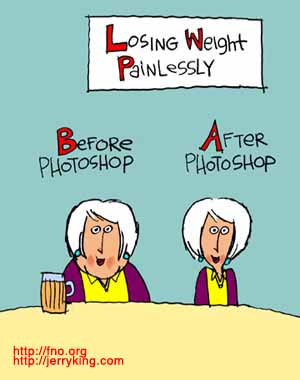
Photoshopping Reality?
- When pharmaceuticals push the use of pills while down playing side effects or hiding knowledge of dangers, they are photoshopping reality. Note NY Times article "Eli Lilly Said to Play Down Risk of Top Pill."
- When corporations like Enron cook their books, they are photoshopping reality.
- When states fail to count minority students and use easy tests to create the impression of progress for NCLB, they are photoshopping reality. Note No Child Left article "NCLB Loopholes."
- When publishers produce history texts that avoid controversy and leave out embarrassing moments, they are photoshopping reality.
|
| Implications for Schools
It is evident that schools must equip all students with a dozen or more literacies, not just the simple and narrow numerical and text literacies now fashionable with right wing politicians and their minions. The well being of any democracy is threatened when young people can pass through school with little awareness of the issues properly addressed within the scope of media literacy. If they are not equipped to consider news critically and thoughtfully, how will they vote or plan their lives?
Media literacy deserves prominent placement in district curriculum documents, especially in language arts, social studies and science. It is all too often ignored or shoved aside onto a "library skills" track.
Types of Literacy*
|
Text Literacy
|
Numerical Literacy
|
Cultural Literacy
|
|
Natural Literacy
|
Media Literacy
|
Social Literacy
|
|
Visual Literacy
|
Artistic Literacy
|
Ethical Literacy
|
|
Kinesthetic Literacy
|
Emotional Literacy
|
Critical Literacy
|
| *This is probably a partial list, as there is little consensus on what qualifies as a literacy. |
Far too much attention in schools is devoted to the gathering of information without showing students how to assess the reliability of sources. If we expect them to be media savvy, we must identify a repertoire of critical thinking skills that would sustain such savvy and then offer learning experiences that gradually nurture mastery of those skills as the students pass through our programs.
|
| Program Strategies
Students should be given ample opportunities to look critically at news coverage, sometimes in English class, sometimes in social studies, sometimes in math and sometimes in science.
For example, a class of high school English or social studies students might look at the USA edition of CNN and compare it with the international edition. Beginning with http://cnn.com, they could critique the focus of the USA edition and then open a second window for the international edition at http://edition.cnn.com/. The juxtaposition of the two should heighten their awareness of how news media focus their attentions.
Math and science students might consider news coverage of a concept such as global warming by going to http://news.google.com/ and searching for articles on that topic. On December 19, 2006, they would have found many articles, the first ten with titles listed below:
- Carmakers Fight Global Warming Lawsuit
- Group Releases Global Warming Report
- Soros Speak: N-proliferation, global warming worrying
- UN Global Warming Finding: White House and other leaders are in
- ExxonMobil funds European global warming skeptics
- Senators Attempt to Muzzle Global Warming Debate
- Global warming film leaves some students cold
- Report codifies steps to confront global warming
- Layton urges collaboration to combat global warming
- Current global warming is just part of a natural cycle
Such articles offer an opportunity to critique the math or science behind the headlines. Students might explore the following questions:
- How sound is the mathematical (or scientific) thinking or research mentioned in this article?
- Who are the authors and chief researchers cited in the article and what do we know about their credentials, their credibility and their potential conflicts of interest?
- Is the information in this article trustworthy?
- How does the information and thinking in this article compare with information in more scholarly articles we have been reading?
- Is any truth lost or sacrificed when the media reports on topics of mathematical or scientific import?
- What techniques, if any, were used to push a point of view?
- How could this article be improved?
- Of all the articles you critiqued, which are the least credible and which are the most credible?
- Where can you find the most reliable information when trying to understand complex issues that influence the quality of life and have math or science as a focus?
Another strategy to emphasize media literacy with social studies, science and math students is to have them visit Chance and Data in the News, a Web site created by Australian teachers who offer hundreds of newspaper articles that are all accompanied by discussion questions calling for students to evaluate the findings reported and whether they are justified by the data collected. http://www.mercurynie.com.au/mathguys/mercury.htm
Sample questions:
- Consider the following questions as you read the articles.
-
- Does the article present enough information about how the study was carried out to reach a conclusion?
- Are you confident about the inference drawn?
- Was the sample size appropriate in your opinion?
- What questions would you ask the investigator and/or the reporter about the article?
In addition to these suggestions, there are many other activities that have been developed by good teachers and those committed to making media literacy an important part of the school experience. Some can be found by visiting the Web sites listed in the next section.
Note: FNO would welcome article queries by classroom teachers who have had success implementing such strategies.
|
Resources
- The Center for Media Literacy (CML) - a nonprofit educational organization that provides leadership, public education, professional development and educational resources nationally.
http://www.medialit.org
- PBS TeacherSource - Media Literacy - Related PBS Sites and Programs
http://www.pbs.org/teachersource/media_lit/related_sites.shtm
- Media Literacy - Key Facts - The Henry J. Kaiser
Family Foundation
http://www.kff.org/entmedia/Media-Literacy.cfm
- The Media Awareness Network A non-profit organization promoting media education. Their web site, one of the largest educational web sites in Canada, provides expansive media and web literacy resources for parents, educators and community leaders. Great lesson plans for teachers.
http://www.media-awareness.ca
- The Media Literacy Clearinghouse - A web site designed for K-12 educators who want to:
- learn more about media literacy
- integrate it into classroom instruction
- help students read the media
- help students become more media aware
http://www.frankwbaker.com/
- The Media Literacy Project — “Our mission is to advance education and advocacy for media justice. Our vision is a world where all people and communities have affordable access to utilize any and all media tools to ensure their self-determination and a healthy media landscape.”
Credits: The photographs were shot by Jamie McKenzie. The camera clip art is courtesy of Jay Boersma.
Copyright Policy: Materials published in From Now On may be duplicated in hard copy format if unchanged in format and content for educational, nonprofit school district and university use only and may also be sent from person to person by e-mail. This copyright statement must be included. All other uses, transmissions and duplications are prohibited unless permission is granted expressly. Showing these pages remotely through frames is not permitted.
FNO is applying for formal copyright registration for articles.
|
|
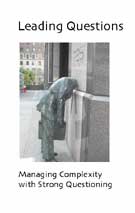 |
|



